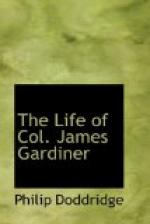He mentions the pleasure with which he had attended a preparation sermon the Saturday before; and then he adds:
“I took a walk upon the mountains that are over against Ireland; and, I persuade myself, that were I capable of giving you a description of what passed there, you would agree that I had much better reason to remember my God from the hills of Port Patrick than David from the land of Jordan, and of the Hermonites, from the hill of Mizar.” I suppose he refers to the clearer discoveries of the gospel with which we are favoured. “In short,” says he immediately afterwards, in that scripture phrase which had become so familiar to him, “I wrestled some hours with the Angel of the covenant, and made supplications to him with floods of tears, and cries—until I had almost expired; but he strengthened me so, that, like Jacob, I had power with God, and prevailed. This,” adds he, “is but a very faint description; you will be more able to judge of it by what you have felt yourself upon the like occasions. After such preparatory work, I need not tell you how blessed the solemn ordinance of the Lord’s supper proved to me; I hope it was so to many. You may believe I should have been exceeding glad, if my gracious Lord had ordered it so, that I might have made you a visit, as I proposed; but I am now glad it was ordered otherwise, since he hath caused so much of his goodness to pass before me. Were I to give you an account of the many favours my God hath loaded me with, since I parted from you, I must have taken up many days in nothing but writing. I hope you will join with me in praises for all the goodness he has shown to your unworthy brother in the Lord.”
Such were the ardours and elevation of his soul. But while I record these memorials of them, I am very sensible that there are many who will be inclined to censure them as the flights of enthusiasm; for which reason, I must beg leave to add a remark or two on the occasion, which will be illustrated by several other extracts, which I shall introduce into the sequel of these memoirs. The one is, that he never pretends, in any of the passages cited above, or elsewhere, to have received from God any immediate revelations which should raise him above the ordinary methods of instruction, or discover any thing to him, whether of doctrines or facts. No man was further from pretending to predict future events, except from the moral prognostications of causes naturally tending to produce them, in tracing of which he had indeed an admirable sagacity, as I have seen in some very remarkable instances. Neither was he at all inclinable to govern himself by secret impulses upon his mind, leading him to things for which he could assign no reason but the impulse itself. Had he ventured, in a presumption on such secret agitations of mind, to teach or to do any thing not warranted by the dictates of sound sense and the word of God, I should readily have acknowledged him an enthusiast, unless he could




